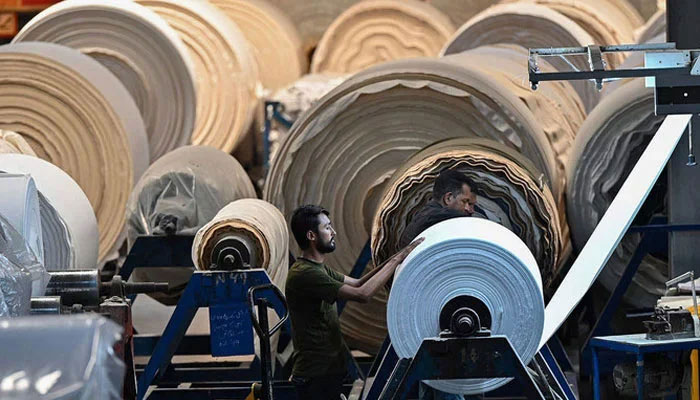Withdrawal of zero-rating on EFS imports key to protecting local textile industry
ISLAMABAD: While reinstating zero-rating on local supplies under the Export Facilitation Scheme (EFS) appears highly unlikely given Pakistan’s current commitments to the International Monetary Fund (IMF), eliminating zero-rating on imports under the same scheme would align fully with IMF programme objectives and may be the only viable policy correction to protect the domestic textile sector.
The removal of zero-rating on local supplies under the EFS was introduced in the FY25 budget as part of broader fiscal consolidation efforts aimed at eliminating tax exemptions and concessions. This move was likely a prior action under the 2024 Extended Fund Facility (EFF) with the IMF. According to the Memorandum of Economic and Financial Policies (MEFP) submitted to the IMF on September 11, 2024, the FY25 budget represents a critical first step towards structural fiscal reforms, targeting a primary surplus of Rs1,177 billion (1.0 per cent of GDP). The budget was passed on June 28, 2024.
The fiscal plan aims to raise an additional Rs1,723 billion in federal revenue, largely through reforms to the general sales tax (GST). The government has committed to increasing GST revenues by Rs286 billion by standardising the rate across most goods. Reduced rates of 5 per cent and 10 per cent are now limited to certain educational, healthcare, and agricultural inputs. Exemptions remain only for essential food and health items, charitable hospital acquisitions (excluding donations from private sources), textbooks, petroleum products, fertilisers and pesticides, as well as items covered by international and bilateral agreements.
The government has also confirmed the termination of the Exporters Facilitation Scheme, requiring exporters to utilise the standard input tax credit mechanism to reclaim VAT on locally sourced inputs. The IMF’s October 2024 Staff Report, issued after approval of the EFF, emphasised the critical importance of the FY25 budget and its revenue measures, noting that reforms to sales tax, income tax, and corporate tax structures -- particularly as they apply to exporters and developers -- are vital for enhancing fairness, transparency and sustainable revenue generation.
Given Pakistan’s low tax-to-GDP ratio, these efforts are seen as foundational. The IMF has stressed the need for continued reforms to broaden the tax base, including through provincial agricultural income taxation, removal of tax exemptions and concessions and improvements to tax administration. These changes are essential to achieving the necessary fiscal consolidation.
Central to the EFF is the withdrawal of preferential tax treatment. The first continuous structural benchmark under the programme explicitly prohibits the introduction of new tax amnesties or preferential tax treatments, including exemptions, zero-rating, tax credits, accelerated depreciation or special rates. This benchmark was met during the programme’s first review. In its updated MEFP submitted on April 24, 2025, the government reaffirmed its commitment not to issue any such concessions through either the federal budget or Statutory Regulatory Orders (SROs).
The IMF’s April 2025 Staff Report cautioned against policy backsliding, noting the risks posed by pressure to introduce concessions for politically connected interests. In this context, the decision to withdraw zero-rating on local supplies under the EFS reflects the government’s strong commitment to ending preferential treatment. Given repeated assurances to the IMF and the formalisation of this approach through structural benchmarks, the reintroduction of zero-rating on local supplies is highly unlikely.
However, zero-rating on imports under the EFS remains in effect and stands out as a significant policy distortion. Maintaining this benefit for imports, while denying it for locally produced inputs, creates a disadvantage for domestic manufacturers. This inconsistency has been acknowledged in discussions with the IMF. Removing zero-rating on EFS imports would align with broader efforts to eliminate exemptions and create a level playing field for local industry, particularly for textile producers who have been adversely affected.
The continuation of import zero-rating distorts input choices for exporters, weakens domestic value chains and leaves the door open to misuse. The EFS has historically been susceptible to leakages, and retaining this concession undermines the credibility of broader reforms. In light of this, removing the zero-rating on EFS imports is not only consistent with programme objectives but also represents a necessary step to support local industry and ensure fair competition.
-
 Kanye West Eyes Performing First-ever Concert In India
Kanye West Eyes Performing First-ever Concert In India -
 Brooklyn Beckham's Claim About Nicola's Wedding Ordeal Gets Challenged
Brooklyn Beckham's Claim About Nicola's Wedding Ordeal Gets Challenged -
 AI Horror: 4 In 5 Young Workers Fear 'AI Could Replace Their Jobs', Says Report
AI Horror: 4 In 5 Young Workers Fear 'AI Could Replace Their Jobs', Says Report -
 Missouri Couple ‘locked Sons In Chicken Pen, Shot Them’ In Shocking Abuse Case
Missouri Couple ‘locked Sons In Chicken Pen, Shot Them’ In Shocking Abuse Case -
 King Charles Receives 'delightful' Royal Baby News
King Charles Receives 'delightful' Royal Baby News -
 Chinese ‘mega Embassy’ Wins UK Approval In London Ahead Of Starmer’s China Visit
Chinese ‘mega Embassy’ Wins UK Approval In London Ahead Of Starmer’s China Visit -
 David Beckham Gives Telling Reaction To Brooklyn’s Public Complaints
David Beckham Gives Telling Reaction To Brooklyn’s Public Complaints -
 Can Ibuprofen Cut Cancer Risks? Study Finds Promising Breakthrough
Can Ibuprofen Cut Cancer Risks? Study Finds Promising Breakthrough -
 Piers Morgan Finally Reacts To Brooklyn Beckham's Statement About David And Victoria Beckham
Piers Morgan Finally Reacts To Brooklyn Beckham's Statement About David And Victoria Beckham -
 Tom Hiddleston Reveals Unlikely DC Character That Inspired Loki
Tom Hiddleston Reveals Unlikely DC Character That Inspired Loki -
 Prince Harry, Meghan Markle Warned 2026 Will Be 'a Big Test' For Them
Prince Harry, Meghan Markle Warned 2026 Will Be 'a Big Test' For Them -
 OpenAI Plans First ChatGPT Device For 2026
OpenAI Plans First ChatGPT Device For 2026 -
 Matt Damon Gets Slammed Over 'out Of Touch' Comparison
Matt Damon Gets Slammed Over 'out Of Touch' Comparison -
 From Chagos Islands To Greenland Trump Flags National Security Risks: Here’s Why
From Chagos Islands To Greenland Trump Flags National Security Risks: Here’s Why -
 Meghan’s UK Return As ‘successful Businesswoman’ Will Put Pressure On Kate Middleton
Meghan’s UK Return As ‘successful Businesswoman’ Will Put Pressure On Kate Middleton -
 Spotify Tests Page Match To Sync Books With Audiobooks
Spotify Tests Page Match To Sync Books With Audiobooks




